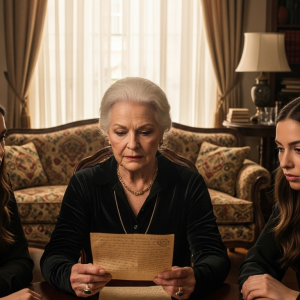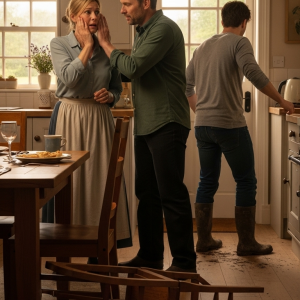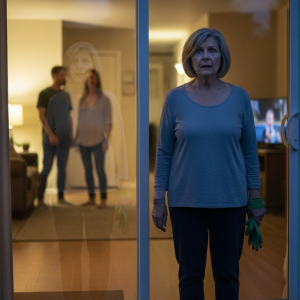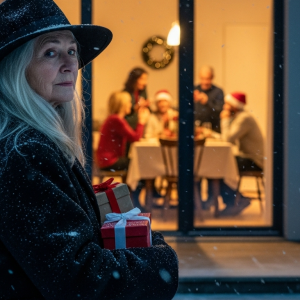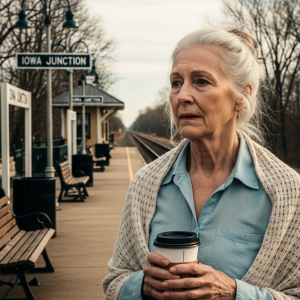I was still breathing, but my son had already brought a notary into the ICU. My daughter-in-law placed a pen in my hand while I was hooked to IVs, and my daughter whispered, “Just sign it, Mom. It’ll ease your mind.” I said nothing. I just stared at my three children and saw three strangers.
I stood at the upstairs window of my house, watching the evening light slip over the water. For two decades, I had watched this same soft pink and gold from the Bradock Retreats, a place I built from scratch for women like me, women who had lost someone and needed to remember who they were.
But that evening, something in the light felt different. At sixty-nine, I was slower on my feet, and my breath had started catching, a weight settling in my ribs that I had been ignoring for months. There was always someone else to guide.
On my desk sat an email draft, three weeks old. Subject: Widow’s Wings. The body had only one line: I am ready to do something that has nothing to do with grief. I didn’t know what it meant then, only that my work had to change. My friend Belinda, the retreat’s director, had told me simply, “Evelyn, it’s time for you to rest.”
In a drawer, I kept a folder for a nonprofit I had quietly created. Widow’s Wings. Three weeks earlier, I had transferred the entire ownership of Bradock Retreats into it. Not a single share remained in my name. I hadn’t told my children—Heather, Malcolm, or Rachel. I didn’t trust what they might do if they knew. I had done something brave, and I had done it alone.
Part 2: The Vultures Gather
I opened my eyes to the sharp scent of antiseptic and the hum of machines. The light was sterile and unfamiliar. Tubes ran down both arms. I could hear the faint rhythm of a heart monitor, and beneath it, the familiar voices of my children. They weren’t whispering about my health. They were talking business.
“She still owns the paperwork,” that was Malcolm, my son, his voice impatient. “If we don’t move now, it’ll all be lost.” Heather, my oldest, replied in her polished tone, “She isn’t in any state to argue. We just need a signature.” Rachel, the quiet one, added, “Maybe she’d want to get it out of the way, for peace of mind.”
A chair scraped. I heard the rustle of a folder. I didn’t need to see it to know what it was. Legal documents. Pressure on my left hand, a pen guided into my fingers. “Just hold it for her,” Heather said, her voice detached, like this was a matter of paperwork, not a mother’s life.
Rachel’s voice was soft in my ear. “Just a signature, Mom. You won’t have to think about it again.” My eyes were open, but they either didn’t notice or didn’t care. They were just silhouettes at the edge of my bed, three strangers with a notary in tow.
I didn’t sign. My fingers stayed loose, and the pen fell, rolling onto the blanket. Nobody spoke. Malcolm let out a breath of pure exhaustion with me. He muttered something and walked out. The others followed. They had come to the hospital not with flowers, but with papers. They had come to collect one more thing, and I hadn’t even left yet.
Part 3: The First Defense
By the third morning, I could sit up without help. The tubes were gone. When Belinda arrived with coffee, her hand flew to her chest. “Thank God,” she whispered. “I was starting to worry.”
“They came,” I said. She nodded. “They brought documents. A notary.” She didn’t need details. Her eyes darkened. “Malcolm called the office,” she said. “Told the receptionist that since you were unwell, he’d be taking over leadership duties at the retreat. Said you had given verbal consent.”
I stared at the gray sky outside the ICU window. I had always known Malcolm was ambitious. I just never believed he would come for what I built while I was unconscious. Belinda watched me. “You don’t have to fight this alone, Evelyn.”
That night, I asked the nurse for my bag. I logged into my private email and opened the Widow’s Wings folder. The retreat’s transfer was complete, signed over to the nonprofit three weeks earlier. It was no longer mine to give. And more importantly, it was no longer theirs to take.
I opened a new note on my phone and began to type. June 4th, ICU. Malcolm brought a notary. Tried to force signature while I was sedated. Heather present. Rachel assisted. I saved the file, backed it up, and emailed it to Belinda with no subject line. The next morning, I told the nurse I wanted to begin walking again. One step, then another. They thought they had found my weakest moment. They didn’t realize I had already let go.
A week later, I was home. The house felt different, the silence heavier. The first thing I did was open the safe. The original trust transfer, the legal handoff of Bradock Retreats, the letters from the board—all were there, dated and signed. I took photos of every page and moved the originals to a new, hidden safe.
The texts came quickly. Heather: Hope you’re resting. Malcolm: Let’s talk this weekend. I didn’t respond. Then, an email arrived from the retreat’s legal counsel. Malcolm had tried to schedule a meeting using my name, claiming he had my authority. I forwarded it to Belinda. “Please make sure all staff are aware of the new structure,” I wrote. “No permissions come from my children.”
I sat in the kitchen, writing down everything I remembered from the hospital. Every word, every glance. Then I flipped to a clean page and made a new list: Call lawyer. Lock down communication. Alert board. Install cameras. Update medical directive. Remove emergency contacts. Change power of attorney. It was clinical, but it was necessary.
By Sunday, I knew they would come. The black SUV pulled into the driveway just after noon. I opened the door before they could knock. Malcolm stood in the center of the living room. “We need to talk,” he said, his voice carrying a weight he thought I would bend to. I sat in my chair by the window. They remained standing.
Heather placed a folder on the table—a power of attorney agreement, medical authorizations, a proposal for a joint account to manage the retreat. “Just sign the first two for now,” Heather said. “It’s temporary.” Rachel added, “It’s just for peace of mind.” I leaned forward and slowly closed the folder. “No.”
Malcolm stiffened. “You haven’t even read it.” I repeated the word, my voice calm but unyielding. “No. I won’t be signing anything.” Heather blinked fast. Malcolm stared. “This isn’t about control,” he snapped.
“I know exactly what this is about,” I said, standing. “And you’re right. It’s not about control. It’s about trust. The kind that was broken the moment you brought a notary into my hospital room.” I walked to the door and opened it wide. “We’re done here.” They left in stunned silence. I locked the door behind them, and for the first time all day, my hands began to tremble. Not from fear, but from release.
The Monday after they left, the house was still. Sometimes stillness is not a void; it’s recovery. By evening, I felt a steady calm return. I called Belinda, and when I told her what happened, she said just one thing: “I’m proud of you.”
On Tuesday, I hand-delivered a letter to the retreat’s board, making it clear that no family members were to be granted access or involved in any decisions. It wasn’t a request; it was a boundary. The voicemails started that evening. Mom, we need to talk. It’s not too late to fix this. I listened once, then deleted them.
On the following Monday, a certified letter arrived from Malcolm’s lawyer. I placed it on the kitchen table and sat across from it for an hour before opening it. It was a formal petition for emergency guardianship, citing my “recent erratic behavior” and the risk I posed to my estate. They called it love and protection. It was control, wrapped in legal language.
I didn’t call them. I called my attorney, Anita Meeks. I handed her my entire file: the hospital records, the transfer documents, and my journal entry from the ICU. She flipped through the pages. “This is not just a defense,” she said, looking up. “This is a pattern.”
We began building a timeline, retrieving security footage of Malcolm trying to gain access to the retreat. By the end of the week, we had filed our formal response. The next day, the doorbell rang. It was Rachel, holding a tray of banana bread. I watched her through the peephole, her expression a careful mask of concern. I did not open the door.
On the morning of the hearing, I wore my navy coat, the one I used to wear to donor meetings. It was a reminder of who I was in rooms like these: a woman with presence. Anita met me on the steps, calm and focused.
Malcolm’s lawyer spoke first, painting a picture of me as isolated, distraught, and vulnerable. He used phrases like “declining judgment.” I listened without flinching.
Then Anita stood. She outlined my career, my accomplishments, my autonomy. She presented the hospital records, the voicemails, the surveillance footage. She closed with a quote from my letter to the board: “The court does not need to protect Mrs. Bradock from others. It needs to protect her from the illusion that family entitles anyone to her legacy.”
The judge, a woman with salt-and-pepper hair, paused. Then she spoke directly to me. “Mrs. Bradock, would you like to address the court?” I stood slowly, my knees steady. I didn’t read from notes. “I built my life with care,” I said, my voice clear. “I gave my children more than I gave myself. But I will not spend my final years apologizing for needing peace. I am not confused. I am not unstable. I am awake.”
The ruling came two days later by mail. The guardianship request was denied in full. The judge cited “potential financial manipulation” on the part of the petitioners and referred the matter for a separate civil inquiry. I placed the letter beside my tea. It wasn’t a shock. It was a release. That night, I wrote in my journal: They tried to write the ending, but the story is still mine, and I am still writing.
The guardianship request was denied, but I knew the fight for the retreat’s soul wasn’t over. The date for the annual Legacy Dinner was circled on my planner. It was the event Malcolm had intended to use to announce his takeover. I hadn’t cancelled it. I had simply changed the guest list.
I invited every person who had been quietly pushed out when the retreat became more exclusive under my children’s influence. The teachers who brought at-risk students, the retired nurses who needed a support group, the women’s shelter coordinator who had given up after four unanswered emails. I wrote to each of them personally: “This is no longer a family enterprise. This is a community commitment.”
Three days before the event, Malcolm showed up unannounced, standing at the edge of my driveway. “What are you doing?” he asked. “Why are you making this personal?” I told him it was never personal; it was necessary. “You won’t have anything left for us when this is done,” he said, his voice hollow. I looked him in the eye. “That’s exactly the point.” Then I closed the door.
The night of the dinner, the grounds were filled not with wealthy donors, but with ordinary people. I stepped up to a microphone and told them the truth: that the retreat was never meant to be gated, and that I was finally returning it to its original purpose. I announced that the land was now in the hands of a community trust, its transfer complete and irreversible.
For a moment, there was silence. Then, slowly, one person stood. Then another. They didn’t clap. They just stood, their eyes filled with a quiet, profound gratitude. The story they had been written out of was finally theirs again.
After everyone had gone, I walked through the empty rooms. The spaces were filled with memory, but none of them owned me anymore. Back home, I found a small envelope taped to my kitchen counter. It was Heather’s handwriting. I didn’t understand. I still don’t. But I’m sorry. No signature, no request. Just a single line that felt like someone letting go. I placed it in a drawer. It no longer hurt to read it.
A week later, a letter arrived, forwarded from the retreat. It was from Malcolm. He wrote that he had driven past and seen people walking freely through the gates. He said he had watched a woman in a wheelchair being pushed down the path by her daughter. He wrote: “I thought you would cave like you always had.” He ended by saying he wasn’t asking for anything, just that he understood now, not why I did it, but that I had the right to.
That night, I called Belinda. I told her about the letter. She said she’d seen a shift in Heather, too—a silence that wasn’t cold, just cautious. I said, “Maybe that’s enough. Sometimes all you get is space. Not closure, not healing, just a little more room to breathe.”
The snow came early that year, dusting the tops of the pines. I had no board meetings to prepare for, no family drama to navigate, just a quiet Sunday in a life I had carved back from the chaos.
I started visiting the retreat again, not as a director, but as a guest. I watched a woman named Joyce, who had been abandoned by her own daughter, teach a pottery class. She never called it art therapy. “It’s just about shaping something with your hands that no one else can shape for you,” she’d say.
As I walked home one day, I passed a stone bench someone had etched with a quote: No one can give you your voice back. You take it when you’re ready. The bench had always been there, but I had never seen the words before.
The story wasn’t over. It wasn’t clean or resolved. But it was mine again. Sometimes healing doesn’t come from a perfect ending, but from telling the story out loud and letting it land where it needs to. And in that, I found a peace that didn’t come from victory, but from the choice to finally, finally choose myself.
